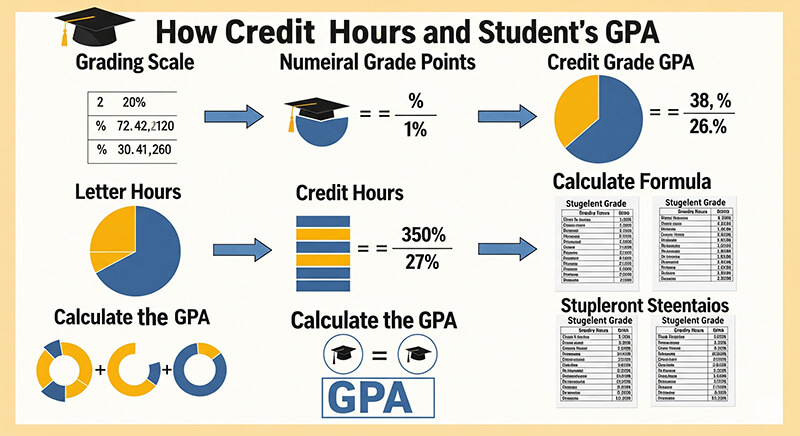How Pass/Fail Grades Impact Your GPA
Key Takeaways
- What is GPA? Your Grade Point Average (GPA) is a number that shows your average grade across all your classes.
- Pass/Fail Basics: This is a grading option where you get a "Pass" or "Fail" instead of a letter grade like A, B, or C.
- "Pass" Grade Impact: In most cases, a "Pass" grade will not affect your GPA at all.
- "Fail" Grade Impact: A "Fail" grade will almost always lower your GPA because it adds credits to your total but adds zero quality points.
- School Policies Matter: Every school has its own rules for pass/fail classes, so you must check with your school.
- Think About the Future: Having many pass/fail grades could make graduate schools or some employers ask questions.
What is a GPA and Why Does It Matter?
Your Grade Point Average, or GPA, is a number that shows how well you are doing in school. High schools and colleges in the U.S. use it to measure academic performance. Think of it as the average of all your grades put together. This number is very important. Colleges look at your GPA when you apply for admission. It is also used to decide who gets scholarships and to check if you are meeting the school's academic standards. The average high school GPA in the U.S. is about 3.0 on a 4.0 scale.
The Simple Way to Calculate Your GPA
Calculating your GPA is straightforward. You take the total number of quality points you've earned and divide it by the total number of credit hours you've taken. The result is your GPA. This method gives a true picture of your academic work because it considers how many credits each class is worth. For an easy way to figure this out, you can use a GPA Calculator to do the math for you. It helps you see where you stand and plan your academic goals.
From Letter Grades to GPA Points
Schools turn your letter grades into points to calculate your GPA. This is usually done on a 4.0 scale. An 'A' is worth 4 points, a 'B' is 3 points, a 'C' is 2, a 'D' is 1, and an 'F' is 0. Some schools also use plus (+) or minus (-) grades, which have slightly different point values. For example, a B+ might be 3.3 points and an A- might be 3.7 points. This system helps create a single number that reflects your grades from all your different classes.
| Grade | Grade Points |
|---|---|
| A | 4.0 |
| A- | 3.7 |
| B+ | 3.3 |
| B | 3.0 |
| C+ | 2.3 |
| C | 2.0 |
| F | 0.0 |
Is GPA the Same as Grade Average?
No, a GPA is different from a simple grade average. A grade average might just add up your grades and divide by the number of classes. A GPA is a weighted average. This means that the number of credits a class is worth changes its impact. This credit hour weighting is important. A 4-credit class will have a bigger effect on your GPA than a 1-credit class. Because of this, GPA gives a more accurate look at your hard work and performance in school.
Understanding Quality Points
Quality Points are the backbone of your GPA calculation. To find the quality points for a single class, you multiply the grade points for your final grade by the number of credit hours for that class. For example, if you get an 'A' (4.0 points) in a 3-credit class, you earn 12 quality points for that course (4.0 x 3). Your total quality points are the sum of the points from all your classes. This total is the number you divide by your total credit hours to find your GPA.
What Does It Mean to Take a Class Pass/Fail?
Taking a class pass/fail means you get a "Pass" or a "Fail" on your transcript instead of a traditional letter grade. Students often use this option for elective classes or subjects they want to explore without the pressure of getting a specific grade. If you meet the minimum requirements to pass the class, you earn the credits. If you don't, you fail. This can be a great way to try a challenging subject outside of your major without worrying that a lower grade might hurt your GPA.
How a "Pass" Grade Affects Your GPA
In most colleges, a "Pass" (P) grade does not affect your GPA. When you pass a class this way, you earn the credits for it, but those credits are not included in the GPA calculation. For example, if you take 15 credits but one 3-credit class is for a "Pass" grade, your GPA will be calculated based on only the 12 credits that have letter grades. This is why students feel safer taking a tough class pass/fail. They can still get the credit they need without risking a drop in their GPA.
The Real Impact of a "Fail" Grade on Your GPA
A "Fail" (F) grade in a pass/fail course usually hurts your GPA. While a "Pass" is often excluded from GPA calculations, a "Fail" is typically included. The failing grade is counted as a 0.0 in the calculation. This means you add the course's credit hours to your total attempted hours but add zero quality points. This combination will lower your overall GPA. As an expert who has seen many student transcripts, I can tell you that avoiding a fail is critical, as its impact can be significant.
Pass vs. Fail: A GPA Calculation Example
Let's see how pass/fail impacts GPA with an example. Imagine a student takes four 3-credit courses.
- Course 1: A (4.0) = 12 quality points
- Course 2: B (3.0) = 9 quality points
- Course 3: C (2.0) = 6 quality points
Scenario 1: Course 4 is a "Pass" If the "Pass" is excluded, the GPA is calculated on 9 credits.
- Total Quality Points = 27
- Total Credit Hours = 9
- Final GPA = 27 / 9 = 3.0
Scenario 2: Course 4 is a "Fail" If the "Fail" is included as a 0, the GPA is calculated on 12 credits.
- Total Quality Points = 27
- Total Credit Hours = 12
- Final GPA = 27 / 12 = 2.25
Not All Schools Are the Same: Policy Variations
It is very important to know that pass/fail policies can be different from one school to another. For instance, at Stanford University, a "No Pass" grade is included in GPA calculations as 0.0 points. However, the University of Michigan excludes both "Pass" and "Fail" grades from GPA calculations. At UConn, a "Pass" requires a D- or better and does not count toward your GPA. At UNC Chapel Hill, a "Fail" is calculated as a 0.0, but a "Pass" grade does not affect GPA. Always check your own school's student handbook or academic advising office.
A Special Rule for NCAA Athletes
Student-athletes have an extra rule to think about. The NCAA Eligibility Center has its own way of calculating GPA for eligibility. When it comes to a pass/fail grade, the NCAA assigns a "Pass" the point value of the lowest passing grade at that high school. For most schools, this is a 'D', which equals 1.0 on the GPA scale. This is a big exception to the common rule where a "Pass" has no GPA impact. For athletes, taking a class pass/fail could actually lower their core course GPA for NCAA purposes.
Student Stories: Why Choose Pass/Fail?
Students often choose pass/fail to manage their stress and workload. During the COVID-19 pandemic, many students shared their thoughts online. One student on X explained that universal pass/fail helped students who were close to academic honors or on probation. Another user advised that if you think you can get an 'A', you should keep the letter grade to boost your GPA. These stories show that students see pass/fail as a useful tool, especially during difficult times, but they are also careful about how it might affect their future.
Before You Choose Pass/Fail: What to Consider
Choosing to take a class pass/fail has benefits, but there are things to think about. Some graduate schools and employers may prefer to see a letter grade, especially for courses in your major. A transcript with too many "Pass" grades might make them wonder about your academic abilities. Also, some schools will not let pass/fail courses count toward your major or minor requirements. My advice is to always use the pass/fail option for electives outside of your main field of study. This lets you explore new interests with less risk.
Frequently Asked Questions (FAQ)
Will a pass/fail class hurt my GPA? A "Pass" grade usually will not hurt your GPA because it is not included in the calculation. However, a "Fail" grade will likely lower your GPA because it adds credits with zero quality points.
Do graduate schools care about pass/fail grades? It depends. One or two pass/fail grades in elective courses are usually fine. However, having many pass/fail grades, especially in your major, might raise concerns for admissions committees.
How do I find my school's pass/fail policy? The best place to look is your school's official website, student handbook, or course catalog. You can also make an appointment with your academic advisor to discuss your options.
Is it better to get a C or a Pass? This depends on your goals. A "C" will lower a high GPA but will be a letter grade that graduate schools can see. A "Pass" will not affect your GPA but might not be accepted for major requirements. If your GPA is already low, a "Pass" might be safer than a "C."




